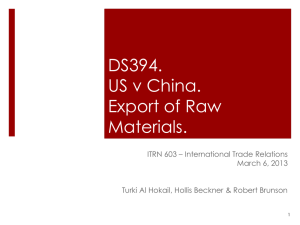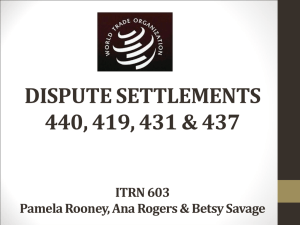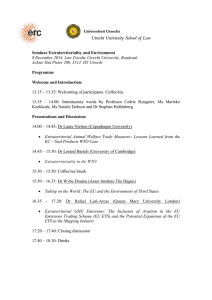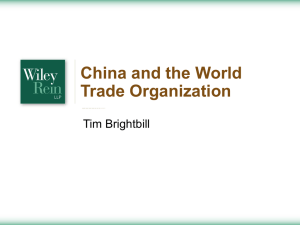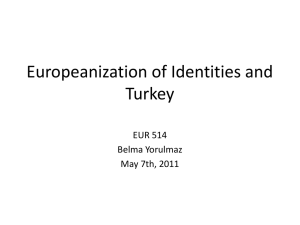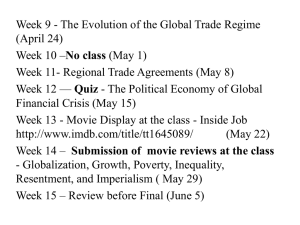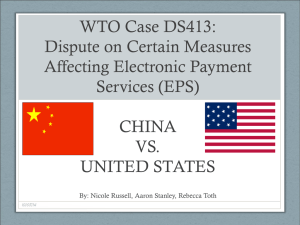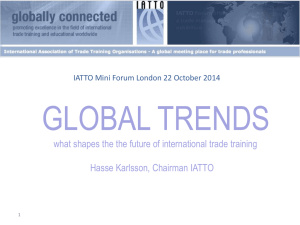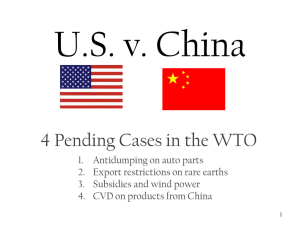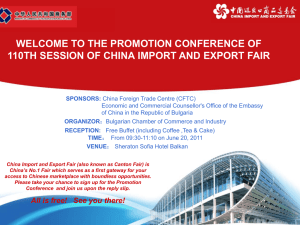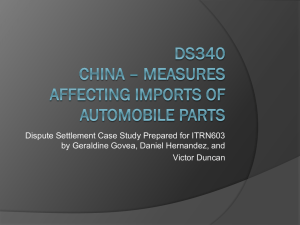Raw Materials - International Trade Relations
advertisement
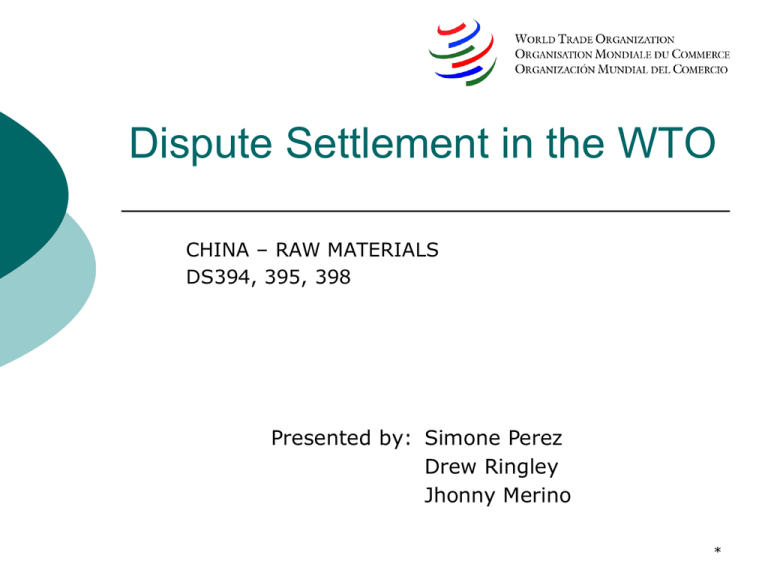
Dispute Settlement in the WTO CHINA – RAW MATERIALS DS394, 395, 398 Presented by: Simone Perez Drew Ringley Jhonny Merino * LET’S TRADE RAW Introduction The WTO adopted the Appellate Body and panel reports on the China—Raw Materials dispute brought by the EU, Mexico, and the United States against Chinese export restrictions and export taxes on bauxite, coke, fluorspar, magnesium, manganese, silicon carbide, silicon metal, yellow phosphorus, and zinc. The decisions offer first impressions on a WTO member government’s ability to regulate trade and public international law norms regarding its natural resources. Dispute Overview Export Restraints of Raw Materials. ○ 32 measures through which China allegedly imposes restraints on the exports in question and note that there appear to be additional unpublished restrictive measures. ○ The Chinese measures as well as any amendments, replacements, related measures, and implementing measures was a violation of several agreements. United States Position June 23, 2009- the United States requested consultations with China in regards to their “restraints on the export from China of various forms of raw materials.” 1 “China imposes on the exportation of these raw materials: (1) export duties; (2) export quotas; (3) export licensing; and (4) minimum export price requirements.” 2 The United States believed that the export restraints would “nullify or impair” possible benefits to “the United States directly or indirectly under the cited agreements.” 3 China’s Position Two Arguments in defense of export duties and quotas: 1) Justified due to the “conservation of exhaustible natural resources of some of the raw materials,” and 4 2) “were necessary for the protection of health of its citizens.” 5 Other Players July 2, 2009, the European Union joined July 6, 2009, Canada, Mexico and Turkey joined the consultations. China accepted the requests of all of the above countries to join the consultation. 6 Panel Report The Panel found: ● China’s export duties and quotas on some raw materials were inconsistent with their WTO obligations ● Panel found China could not use the exceptions in Article 20 of the GATT 1994 to justify its export duties 7 ● Panel did not agree with US and Mexico’s claim that the allocation and administration of export quotas violated WTO obligations ● However, European Union brought a separate claim on the issue and succeeded 8 Specific Agreements Cited GATT 1994 ● Article VIII, VIII:1, VIII:4 ● Article X, X:1, X:3 ● Article XI, XI:1 Protocol of Accession of the People’s Republic of China (Accession Protocol) ● Part I, para. 1.2, para. 5.1, para. 5.2, para. 8.2, para. 11.3 * Explanation of GATT 1994: Art. VIII, VIII:1, VIII:4, X, X:1, X:3, XI, XI:1. Article VIII, Article VIII:1, Article VIII: 4 Fees & formalities connected with importation and exportation are covered in this specific article. ● These should be a fair reflection of cost and not be used as a means of protection Article X, Article X:1, Article X:3 This article covers the publication and administration of trade regulations. ● All trade measures of Members should be published and transparent Article XI, Article XI:1 Covers the general elimination of quantitative restrictions. ● Trade restrictions should be in the form of duties, taxes, and other charges whether effective through quotas, import and export licenses, and other measures, ultimately requiring the tariffication of all quantitative restrictions. All new trade measures to be in the form of tariffs. Agreements (GATT) Article VIII: Fees and Formalities connected with Importation and Exportation 1.(a) All fees and charges of whatever character (other than import and export duties and other than taxes within the purview of Article III) imposed by contracting parties on or in connection with importation or exportation shall be limited in amount to the approximate cost of services rendered and shall not represent an indirect protection to domestic products or a taxation of imports or exports for fiscal purposes. * Agreements (GATT) Continued. Article VIII: Article VIII: Fees and Formalities connected with Importation and Exportation 4. The provisions of this Article shall extend to fees, charges, formalities and requirements imposed by governmental authorities in connection with importation and exportation Article X: Publication and Administration of Trade Regulations 1. Laws, regulations, judicial decisions and administrative rulings of general application, made effective by any contracting party, pertaining to the classification or the valuation of products for customs purposes, or to rates of duty, taxes or other charges, or to requirements, restrictions or prohibitions on imports or exports or on the transfer of payments therefor, or affecting their sale, distribution, transportation, insurance, warehousing inspection, exhibition, processing, mixing or other use, shall be published promptly in such a manner as to enable governments and traders to become acquainted with them. Agreements affecting international trade policy which are in force between the government or a governmental agency of any contracting party and the government or governmental agency of any other contracting party shall also be published. ……. * Agreements (GATT) Continued Article X: Fees and Formalities connected with Importation and Exportation 3. a) Each contracting party shall administer in a uniform, impartial and reasonable manner all its laws, regulations, decisions and rulings of the kind described in paragraph 1 of this Article. (b) Each contracting party shall maintain, or institute as soon as practicable, judicial, arbitral or administrative tribunals or procedures for the purpose, inter alia, of the prompt review and correction of administrative action relating to customs matters. Such tribunals or procedures shall be independent of the agencies entrusted with administrative enforcement and their decisions shall be implemented by, and shall govern the practice of, such agencies unless an appeal is lodged with a court or tribunal of superior jurisdiction within the time prescribed for appeals to be lodged by importers; Provided that the central administration of such agency may take steps to obtain a review of the matter in another proceeding if there is good cause to believe that the decision is inconsistent with established principles of law or the actual facts. * Appellate Body August 31, 2011, China stated its intention to appeal September 6, 2011, the US stated its intention to appeal October 28, 2011, the Chair of the Appellate Body stated that due to the size of the appeal it would take longer than 90 days 9 Appellate Body Appellate Body upheld the Panel's finding that: ● China’s export duty and quota measures needed to be brought into conformity with WTO obligations ● China’s export quota on “refractory-grade bauxite” was not proven by China to be “‘temporarily applied’ to either prevent or relieve a ‘critical shortage’” 10 Appellate Body Appellate Body found the Panel's erred in their: ● understanding of “‘made effective in conjunction with’ in Article XX(g) of the GATT 1994” as ensuring the “effectiveness of restrictions on domestic production and consumption” 11 ● findings regarding the allocation and administration of export quota, fees and formalities associated and export licensing requirements and declares the Panel’s finding as “moot and of not legal effect” 12 Findings 1. The decision provided guidance on how exceptions to GATT prohibition on export restrictions relate to general international law principles regarding sovereignty over natural resources. 1. Clarified the relationship between China’s Accession Protocol and the GATT, particularly finding that China could not invoke GATT exceptions with respect to certain accession commitments that exceeded basic GATT disciplines. 1. The Appellate Body confirmed that the complainants could challenge temporary but renewable measures by China that operated jointly with other measures to restrict exports. 4. Inconsistent with WTO obligations History The Appellate Body has interpreted China's Accession Protocol on two previous occasions, once dealing with the availability of Article XX as a defense to justify a violation of China's Accession Protocol. In China – Publications and Audiovisual Products, China invoked Article XX of the GATT 1994 to justify a violation of Paragraph 5.1 of its Accession Protocol dealing with trading rights. In its assessment, the Appellate Body did not discuss the systemic relationship between provisions of China's Accession Protocol and those of the GATT 1994, within the WTO Agreement. The Appellate Body instead focussed on the text of the relevant provisions of the Protocol, including an examination of the meaning of the particular terms at issue, as well as the surrounding context and overall structure of the Accession Protocol. Context In the present dispute, the Panel is not dealing with Paragraph 5.1 of China's Accession Protocol; rather the Panel must interpret the altogether different language found in Paragraph 11.3 of China's Accession Protocol in order to determine whether GATT Article XX defences are available to justify violations of Paragraph 11.3 of China's Accession Protocol. "China shall eliminate all taxes and charges applied to exports unless specifically provided for in Annex 6 of this Protocol or applied in conformity with the provisions of Article VIII of the GATT 1994." Context - Annex 6 For the Panel, the ordinary meaning of the terms "shall eliminate" is that China, at the time of the conclusion of its Accession Protocol, was maintaining export duties. The complainants report that at the time of its accession to the WTO, China maintained export duties on 58 products. Annex 6 of China's Accession Protocol lists 84 products on which some export duties were possible. At the time of China's accession to the WTO, WTO Members and China agreed that China would not maintain any export tariff taxes and charges, except on those 84 products and within the maximum levels provided in Annex 6, or if such charges could be justified under GATT Article VIII. In the Panel's view, the ordinary meaning of these two sentences of Annex 6 is very clear. The use of the term "maximum levels" sets a definitive ceiling in excess of which China may not impose export duties. Furthermore, the second sentence makes clear that any increase in the export duty rates applied at the time of the conclusion of China's Accession Protocol could be effected only in exceptional circumstances following consultations with affected Members. Business/Political/Economic Environment In 2009, the U.S. unemployment rate hit 10.2%, which was the highest in 26 years and was the peak of unemployment during the recession. - Could this have had an impact on pressuring the U.S. to take steps to stop “unfair” competition from China with raw materials used in manufacturing? Business/Political/Economic Environment Excerpt from Obama campaign speech in 2008 at the Alliance for American Manufacturing Association forum on trade and manufacturing: “We need real change, and that’s what I’m offering. I’m offering a new, more transparent and more inclusive path on trade so we can help promote an integrated global economy where the costs and benefits are distributed more equitably. And it starts with a principle I’ve always believed in – that trade should work for all Americans.... That’s why we need to finally confront the issue of trade with China. As I’ve said before, America and the world can benefit from trade with China. But trade with China will only be good for you if China itself plays by the rules and acts as a positive force for balanced world growth.” Implementation March 23, 2012, China stated its intent to address the recommendations however it requested a “reasonable period” in which to accomplish.12 May 24, 2012, China and US came to agreement of what a “reasonable period” time frame was.13 January 28, 2013, China reported on December 28, 2012 China had implemented legislation to address the panels recommendations. 14 Conclusion The China—Raw Materials case provides a cautionary tale for raw-material exporting countries as they negotiate WTO accession. It suggests that if an acceding country wishes to invoke GATT Article 20 and other exceptions to manage its resource exports, it must ensure that its terms of accession expressly provide for such measures. More generally, the issue of the relationship between rights under general public international law, such as permanent sovereignty over natural resources, and WTO obligations continues to be a source of tension. The panel in China— Raw Materials confronted the issue explicitly, concluding that WTO obligations prevailed. Bibliography WTO. “ Panel and Appellate Body proceedings” in “Dispute Settlement: Dispute DS 394, China- Measures Related to the Exportation of Various Raw Materials.” http://www.wto.org/english/tratop_e/dispu_e/cases_e/ds394_e.htm “WTO: China- Measures Related to the Exportation of Various Raw Materials.” AB-2011-5. https://docs.wto.org/dol2fe/Pages/FE_Search/FE_S_S009Html.aspx?Id=93421&BoxNumber=3&DocumentPartNumber=1&Language=E&Window=L&PreviewContext=DP&FullTextSearc h=#KV_GENERATED_FILE_00002f.htm “Dispute Settlement: Dispute DS 394, China- Measures Related to the Exportation of Various Raw Materials.” Panel Report, WTO. https://docs.wto.org/dol2fe/Pages/FE_Search/FE_S_S009DP.aspx?language=E&CatalogueIdList=55573,108753,96753&CurrentCatalogueIdIndex=1&FullTextSearch=. “General Agreement on Tariffs and Trade 1994” WTO. http://www.wto.org/english/res_e/booksp_e/analytic_index_e/gatt1994_04_e.htm#article8 “Protocol on the Accession of the People’s Republic of China.” www.mofcom.gov.cn/table/wto/law02.doc WTO Appellate Body Report, China - Measures Related to the Exportation of Various Raw Materials, 2012, http://www.wto.org/english/tratop_e/dispu_e/394_395_398abr_e.pdf “Summary of GATT Articles” Read, Robert; www.lancaster.ac.uk/staff/ecarar/gatt%20articles.doc “U.S. Unemployment Rate Hits 10.2%, Highest in 26 Years”; New York Times; Goodman, Peter; 11/07/2009; http://www.nytimes.com/2009/11/07/business/economy/07jobs.html?_r=0 “Obama's Speech on Manufacturing and Trade” Speaker: Barack Obama, Published April 14, 2008. http://www.cfr.org/elections/obamas-speech-manufacturing-trade/p16018
